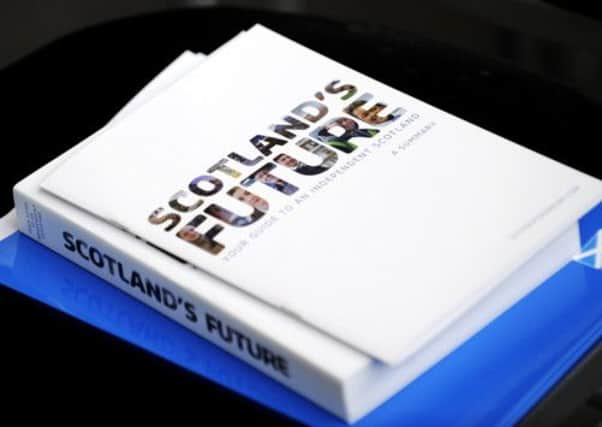Eddie Barnes: White paper unlikely to sway voters


As the great referendum roadshow begins to wind down over the coming weeks for its Christmas break, the big picture story of 2013 is that, despite all the huff, puff, debate and venom, not an awful lot has moved on.
As analysis by Professor John Curtice detailed this week, about the only thing anyone can agree on is that the balance of public opinion has been “remarkably stable”. Curtice noted that, at 39 per cent, the latest average Yes vote in all polls in Scotland differs by a single one percentage point from the average figure between February and May this year. Public opinion has ossified. Perhaps voters are taking the view that something that looks so disputatious is best left alone until such time as it really needs dealing with.
Advertisement
Hide AdAdvertisement
Hide AdThe hope on the Yes side was that the publication of yesterday’s white paper might snap Scottish voters out of their torpor and raise their sights to the possibilities on offer. The long-held view among many is that it needs to build up momentum quickly to build up and solidify the Yes core vote. But, despite hyperbolic claims yesterday from SNP MSP Joan McAlpine that the 670-page tome published by Salmond and Sturgeon “makes America’s historic Declaration of Independence look like a Post-it note”, the likelihood is that what turns out to be a rather dry, sober attempt to make the case for independence is unlikely to topple the likes of EL James or JK Rowling from the best-seller lists this Christmas, or trigger a sudden revolution in voting habits. So, if the white paper doesn’t move popular opinion, what might before next September’s date? Is there another game-changer out there?
The most likely candidate, argue some Scottish political scientists, is the European elections in May. Ukip is now the bookmakers’ favourite to become the largest party, with mostly English voters expected to register a protest vote. Such a shock win might prompt all the UK parties to provide reassurances to England’s voters in the form of a tougher stance on immigration and Europe. And such an outcome would, the theory goes, perfectly illustrate the diverging nature of the United Kingdom, demonstrating to Scottish voters that they were best checking out.
Add to that a confident Commonwealth Games at the end of July, showing the country off as capable of staging a global event, and so a potentially fertile ground is laid for Alex Salmond to parade his brand of can-do nationalism next summer and autumn. The events of yesterday – as he was forced time and again to provide dry economic rationale for a currency union which Scots already enjoy –lacked the necessary sparkle that the Yes camp requires if it is to compete. But plenty more opportunities for the Grand Opportunist lie in store.
SEE ALSO: